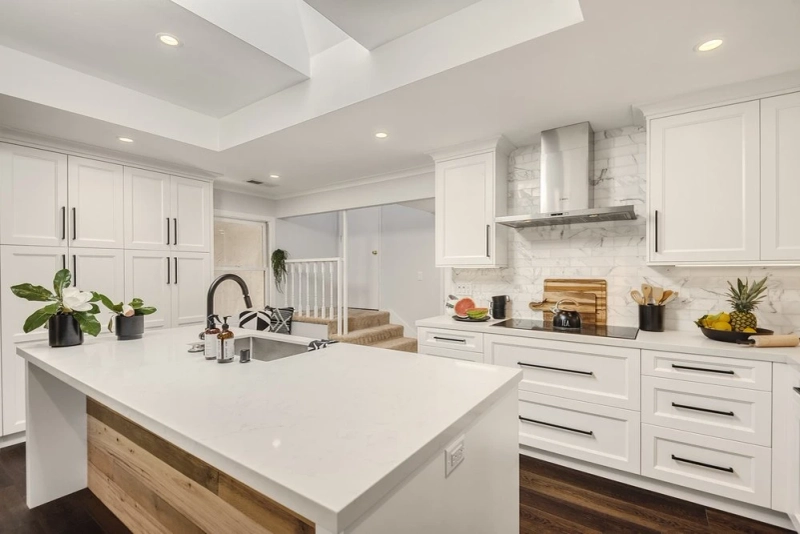Designing a kitchen is more than just selecting cabinets and countertops—it\'s about creating a space that blends functionality with aesthetics seamlessly. Whether you\'re renovating your existing kitchen or building a new home, choosing the right kitchen designer is crucial to achieving your dream culinary space. Here’s a comprehensive guide to help you navigate the process and make an informed decision.
Understand Your Needs and Style
Before you start searching for a kitchen designer, take some time to assess your needs and preferences. Consider the following questions:
- What is your cooking style?
- How much storage space do you need?
- Do you entertain frequently?
- What style appeals to you—modern, traditional, minimalist?
Understanding your lifestyle and preferences will guide your discussions with potential designers and ensure they can create a kitchen that aligns with your vision.
Research and Gather Ideas
Browse through magazines, websites, and social media platforms like Pinterest to gather inspiration for your kitchen design. Save images of kitchens that resonate with you and note down specific features or styles you like. This will help you articulate your preferences to potential designers and give them a clearer idea of what you\'re looking for.
Set a Realistic Budget
Establishing a budget early in the process is essential. Your budget will influence the materials, appliances, and overall design choices. Be upfront with your designer about your budget constraints so they can propose solutions that align with your financial plan. A good designer will help you prioritize where to allocate your funds for maximum impact.
Seek Recommendations and Check Credentials
Ask friends, family, and colleagues for recommendations based on their experiences with kitchen designers. Personal referrals can provide valuable insights into a designer’s professionalism, creativity, and ability to meet deadlines.
Additionally, check the credentials and certifications of potential designers. Membership in professional associations like the National Kitchen and Bath Association (NKBA) can indicate a commitment to industry standards and ongoing education.
Review Portfolios and Previous Work
Once you have a shortlist of designers, review their portfolios and visit completed projects if possible. Pay attention to the quality of craftsmanship, attention to detail, and overall aesthetic appeal. This will give you a sense of each designer’s style and capabilities.
Schedule Consultations
Arrange consultations with two or three designers who align with your style and budget. During these meetings, discuss your project in detail:
- Share your ideas, preferences, and lifestyle considerations.
- Ask about their design process and how they approach projects.
- Inquire about the timeline for completion and potential challenges.
A face-to-face meeting will also allow you to assess their communication style, professionalism, and enthusiasm for your project.
Evaluate Communication and Compatibility
Effective communication is key to a successful collaboration with your designer. Choose someone who listens to your ideas attentively, asks insightful questions, and communicates clearly throughout the design process. Trust your instincts—if you feel understood and comfortable with a designer, it’s likely a good fit.
Consider Project Management and Coordination
Ask about the designer’s approach to project management and coordination with contractors, architects, and suppliers. A skilled designer should oversee the entire project to ensure it stays on schedule and within budget. Clarify who will be responsible for ordering materials, scheduling deliveries, and overseeing installations.
Understand the Contract and Payment Schedule
Before making a final decision, review the contract carefully. It should outline the scope of work, project timeline, payment schedule, and responsibilities of both parties. Ensure there is clarity on additional costs, such as design revisions or unforeseen circumstances.
Conclusion
Selecting a kitchen designer is a significant decision that will impact the functionality and enjoyment of your home for years to come. By understanding your needs, setting a realistic budget, and thoroughly researching potential designers, you can find a professional who aligns with your vision and delivers exceptional results.
Kitchen design services offer expertise in creating layouts that optimize space and workflow while reflecting your personal style. A kitchen design consultant can provide valuable insights and recommendations based on their industry knowledge and experience.
Investing time and effort into choosing the right kitchen designer will ensure your kitchen becomes the heart of your home—a space that is both beautiful and functional, tailored to your unique needs and preferences. With the right designer by your side, your dream kitchen is within reach.
Choosing a kitchen designer is not just about finding someone to create a beautiful space—it’s about finding a partner who understands your vision and can bring it to life with expertise and creativity. By following these guidelines, you\'ll be well-equipped to make an informed decision and embark on an exciting journey towards your ideal kitchen.


